By: Eric Yin
Published 2021/01/06 at 1:06 am
SEATTLE – In 1996 the story was all about Jordan and the Bulls. Coming off a historic 72-10 regular season, the Bulls tore through the East and rolled into the finals riding a 11-1 playoff record, before dusting aside the pesky Sonics. This feat was only further cemented in legend as ’96 was the first full season that Michael Jordan played after his father’s death. Combined with the fact that the decisive game of the finals was won by the Bulls on Father’s Day, and you have a legend on your hands. It was a picture-perfect story: the mythical hero returns from retirement playing for his late father, winning the final game on Father’s Day. But every story has two sides, and this post is about the untold tale of the Bulls opposition: the 1996 Seattle SuperSonics.
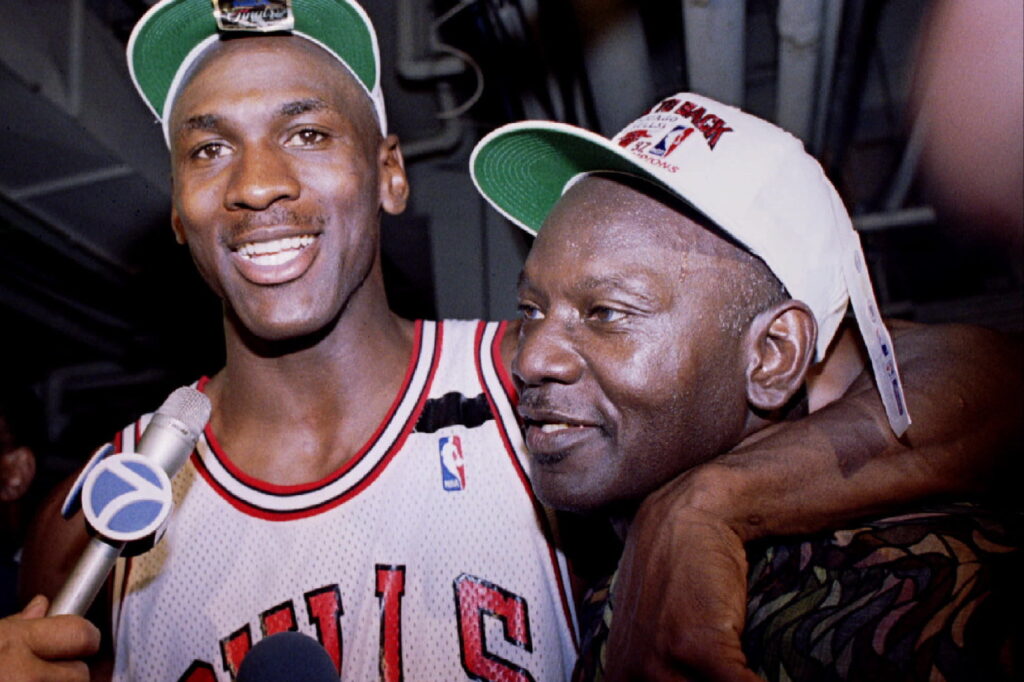
Michael Jordan (left) celebrates back-to-back championships with his late father James Jordan (right).
It is easy to forget about the Sonics as even amongst Jordan’s many opponents throughout the years, the Sonics were not even the most iconic. Not nearly as flashy as the Utah Jazz with dishing point guard John Stockton and dominant interior force Karl Malone, nor as youthful and exciting as the Shaq-Penny Magic in the East, the Sonics were often an afterthought, only significant as they were the opponents facing the Bulls in their historical run. But in the 1996 season, the Sonics did what they had never done before. They achieved a franchise best 64-18 record and clinched the West’s #1 seed. In the post-season, Seattle managed to go 11-4 and reach their first ever NBA finals against none other than the record setting Bulls. Despite such success, all of Seattle’s accomplishments paled in comparison to Jordan’s Bulls. Seattle had a franchise best 64-18 record, but the Bulls the NBA-best 72-10 record, which at the time was the all-time winningest team in NBA history. Seattle went 11-4 in the playoffs a very dominant run, yet the Bulls went 11-1, only dropping one game to the pesky Knicks. The Sonics were known for their stout defense, yet the Bulls were the incarnation of defense, featuring 3 NBA All-Defensive First Team players. In almost every possible way, the Bulls seemed to out-class the Sonics. Entering the finals, the Sonics were faced with the monumental task of overcoming the already dynastic Bulls. After falling down 0-3 in the series, including a 18 point blow out in game 3, it would take a herculean effort from the Seattle squad to even muster a single win. It’s time to meet our protagonist, Gary Payton.
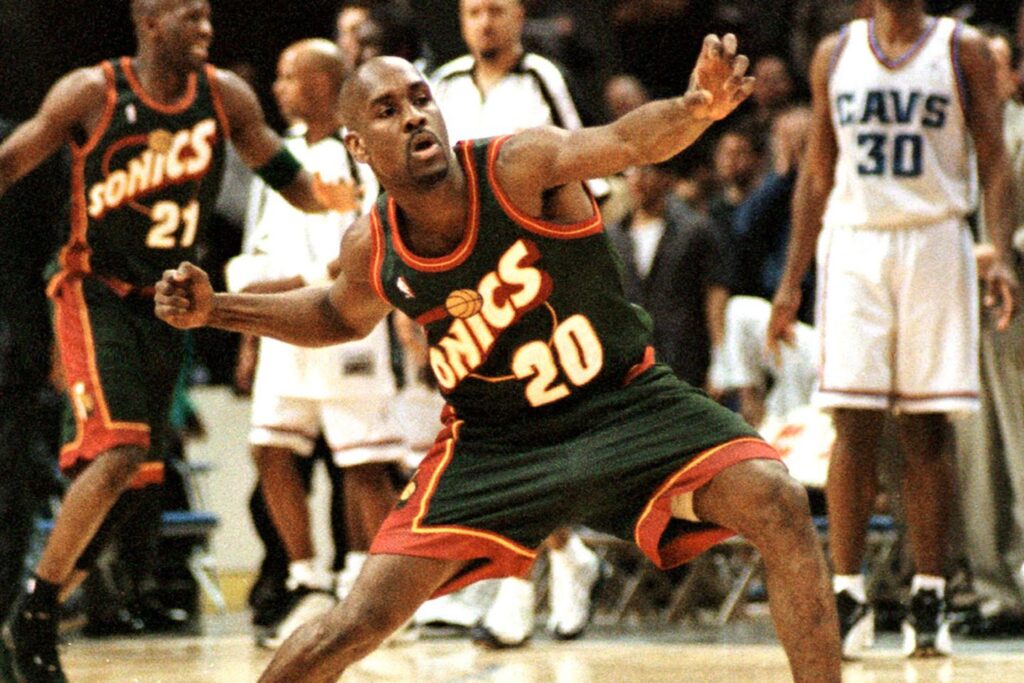
One of Seattle’s most beloved sports stars, Gary Payton (20) talked the talk and walked the walk.
A young point-guard out of Oregon, Payton joined the league in the 1990s, right at the beginning of Jordan’s claim to fame. And it would be during the peak of Jordan’s powers and the Bulls defensive prowess that Payton made it to 9 straight NBA All-Defensive First Teams, easily cementing himself as one of if not the greatest pound for pound defensive player in the history of the game. A surprising feat in of itself, as during the Bulls stretch of dominance, the NBA All-Defensive team was almost an exclusively Bulls club, regularly featuring 3+ Bulls members on the First Team. Despite all those accomplishments, however, it would be in 1996 season specifically that Payton put the league on lock earning his infamous nickname, The Glove. Playing defense as tight as a glove fits a hand, Payton led the league in steals and bullied his way into getting the NBA Defensive Player of the year award. But like in any good story, the protagonist always needs a partner-in-crime, and who better to fit defensive all-star Gary Payton than the interior terror Shawn Kemp. Nicknamed Reign Man due to his physical playstyle and the nature of Seattle being an extremely rainy city, Kemp would go on to be a 6x NBA All-star. Together, Payton and Kemp would form the Sonic Boom, one of the greatest and most exciting duos in NBA history. And in 1996 the stars finally aligned for Seattle. The two led a historically inept Sonics franchise to a Western Conference and franchise best 64-18 record, and after edging out Utah 4-3 in the conference finals made it to the NBA Finals. But it wasn’t without any turmoil. While Utah’s Stockton and Malone would become one of the most dominant duos in NBA history, they had yet to truly take off as evident by a decent 53-win season. So why was the conference finals so close? Well during the series, Payton tore his calf muscle and was not playing at his absolutely best; a situation that was further exacerbated when backup point guard Nate McMillan also went down with a playoff ending injury. So despite edging out the Jazz by the skin of their teeth, the Sonics were now limping into the finals faced with an unprecedented task: beat Jordan and the Bulls.
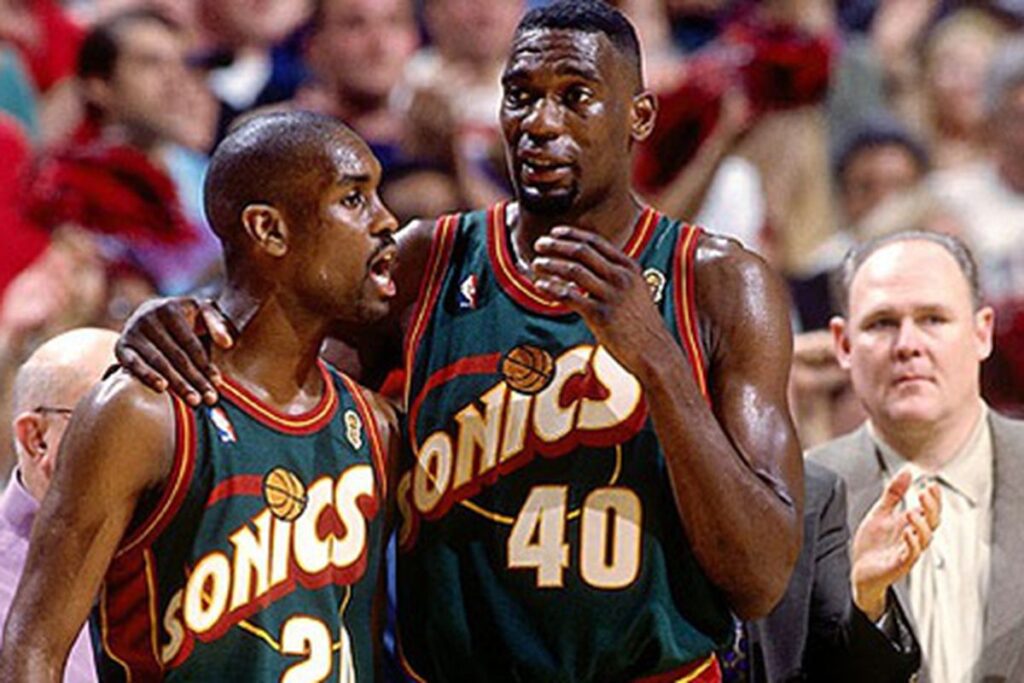
Gary Payton (left 20) and Shawn Kemp (right 40) formed the dynamic Sonic Boom duo that dominated the west in 1996.
Entering the finals against the Bulls, Seattle look spent. A cute little story, a nice little run, but now Seattle would get clean swept out of the finals by the big boys. The Sonics had 1 hobbled superstar in Payton, and another decent star in Kemp, meanwhile the Bulls were rostering the reigning MVP Michael Jordan, the greatest rebounder of all time in Dennis Rodman, a top 25 player of all time in Scottie Pippen, and one of the greatest sixth men of all time in Toni Kukoc. And in the first 3 games it was about as bad as it could be. Rather than pit the Defensive Player of the Year Gary Payton against the league MVP Michael Jordan, coach George Karl instead chose to rest Payton on defense due to his calf-tear, instead having Payton focus on offense. A choice that made sense as Payton’s defensive style relied heavily on quick cuts and movements, his calf-tear being absolutely detrimental to his playstyle. This was a disastrous choice, with Payton struggling on offense and failing to produce any meaningful defensive impacts, the Sonics quickly fell behind 0-3 and the Bulls seemed poised to sweep the series. In desperation, Coach Karl put Payton on Jordan and the series truly began.
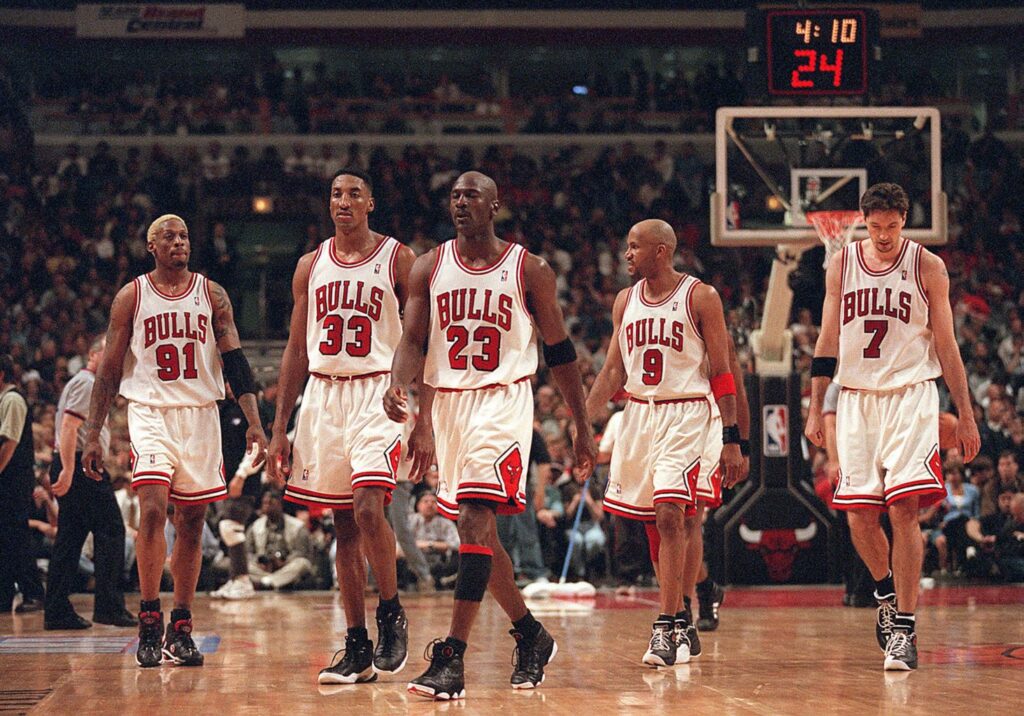
The dynastic Bulls were led by superstar shooting guard Michael Jordan (23) supplemented by all-timers Scottie Pippen (33) and Dennis Rodman (91), and in 1996 the Bulls looked unstoppable.
A hobbled Payton did what no one had ever done in an NBA finals: slow down the GOAT of basketball. With his physical swiping style of defense, Payton managed to weather down Jordan despite being nearly 40 pounds lighter and clawed the Sonics back into the series, winning two straight elimination games, forcing a game 6. Already, the Sonics had won twice as many games against the Bulls than the entire eastern conference and did so with Payton playing on one good leg. Payton’s pressure on Jordan was astronomical, slowing down a Jordan who had been averaging 31 ppg on 46% FG shooting throughout the first three games, to just 23.7 ppg on 36.7% FG shooting. Game 6 would prove to be the end of this run, with Gary Payton absolutely gassed averaging nearly 46.5 minutes per game over the series (the max being 48). The Sonics simply ran out of steam, and the series ended in 6. Despite being gassed, Payton still did his best in the final game of the series, and held Jordan to a series low 22 points while contributing 19 points and 7 assists of his own on the other end.
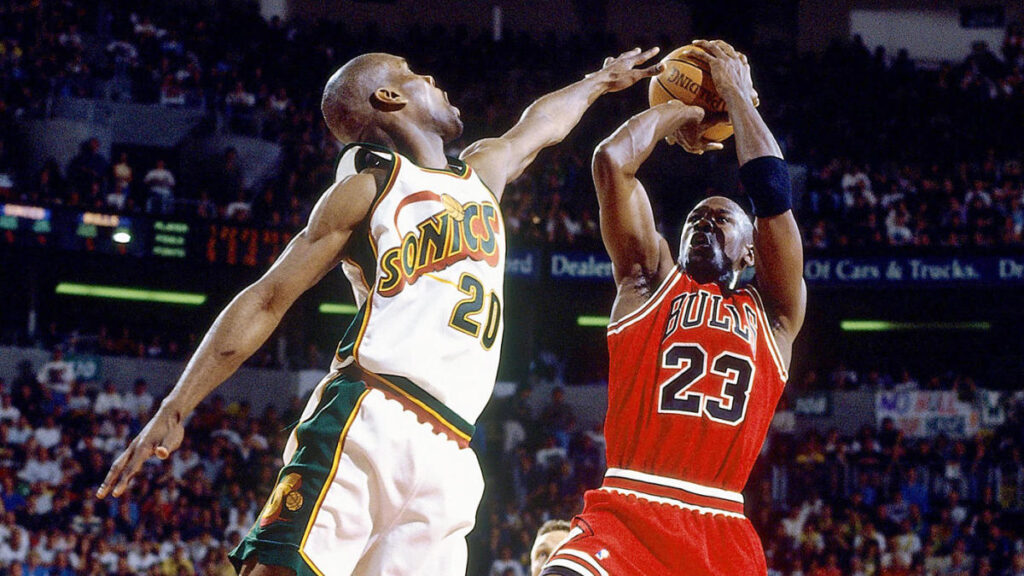
With the Sonics back’s against the wall, an injured Payton began defending Jordan and turned the tide of the series.
At the end of the finals, Seattle sports fans can only be left thinking what if?
What if Payton had been on Jordan since the beginning of the finals? Through the first 3 games with Payton not defending Jordan, the Bulls had it easy averaging 102.3 ppg, just under 3 points shy from their regular season average. With Payton guarding Jordan, however, the Bulls average plummeted to only 83.7 ppg, a nearly 19 point deficit. The Sonics meanwhile averaged 88 ppg in games 1-3 where Payton wasn’t guarding Jordan, and 90.3 ppg in games 4-6 when Payton was guarding Jordan, both significantly lower than their season average of 104.5 ppg. The Sonics did not win games 4 and 5 because their offense somehow got demonstrably better over the back stretch. They solely won games 4 and 5 because of Payton’s defense on Jordan which was further affecting the ability of the Bulls to run their Jordan-centric offense. In essence, Payton was not only responsible for the large dip in Jordan’s individual performance, but also responsible for the 19-point deficit in the Bulls offensive prowess.
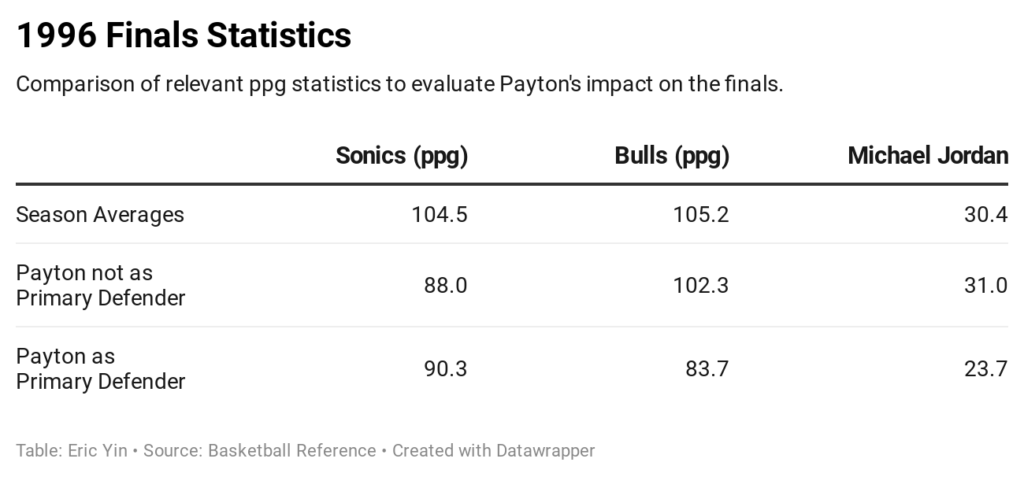
Now the fun part. Let’s imagine a scenario where Payton had been put on Jordan earlier in the series. Using the 84 (rounded up from 83.7) ppg average the Bulls had through games 4-6, and retroactively applying it to games 1-3, the Sonics would have swept the series. In fact, the Bulls averages through games 4-6 would have netted them one win in the finals. Obviously this is incredibly skewed analysis as the Bulls game by game scores could have massive fluctuation, but the point remains that with Payton on Jordan, the Bulls were significantly worse. The Bulls performance in the final 3 games was so atrociously bad that the Sonics with an injury riddled roster, averaging just 89.2 points per game for the series, had a chance to reverse sweep them. Just one last thing to consider. The Sonics had averaged 102 ppg for the regular season, and their offense was humming in the playoffs prior to Payton’s injury. It would not be far fetched to say that their 89.2 ppg average for the 1996 finals was possibly some of the worst offense they had played all season long. This offense, with their season low averages, likely would have easily beaten the Bulls if Payton had been put on Jordan earlier.
In fact let’s just go a step further: instead of replacing the Bulls entire team ppg averages, lets instead only consider Payton’s direct affect on Jordan. So instead of substituting each game score with 84 ppg, let’s instead substitute Michael Jordan’s ppg values in games 1-3 with his averages when guarded by Payton. If we give all the benefit of the doubt and only consider the direct impact Payton had on Jordan (despite the fact Payton had very clearly disrupted the Bulls entire offense), the Sonics still would’ve won enough games to force a decisive game 7. While this is all analysis done after the fact and no one can know how it truly would’ve went down, the stats say there’s a very strong case that the Sonics would’ve won that series even with an injured Payton. Now imagine a world where Payton wasn’t injured, or had an injury that did not heavily injure his leg which is crucial to his defensive playstyle, perhaps the game scores would’ve been even more skewed in the Sonics favor. Just a thought to chew on and consider before we start proclaiming the 1996 Jordan Bulls are the greatest team to ever exist, when they struggled to even overcome an extremely weakened Sonics squad.
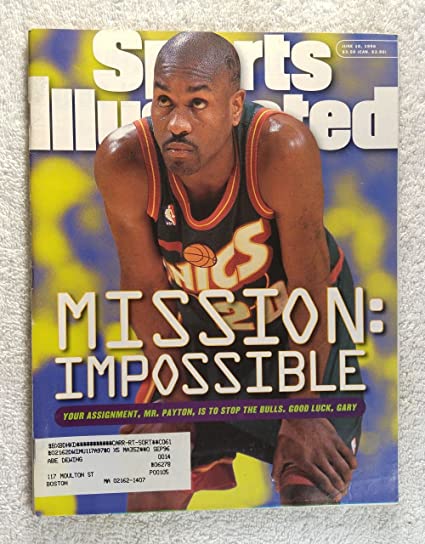
In 1996, the Sonics and Gary Payton were just a step away from completing Mission Impossible: beating the ’96 Bulls.
The 1996 Sonics were perhaps the greatest team the Bulls had ever faced in the finals. A hobbled Payton who played nearly 46.5 minutes per game put his heart out on the court, and almost conquered the NBA’s greatest team by overcoming a 0-3 deficit. One single decision, to put The Glove on Jordan, resulted in a near 19-point swing in favor of the Sonics, and for just a moment, Gary Payton and the Seattle SuperSonics made everyone believers as they turned the 1996 finals on its head.